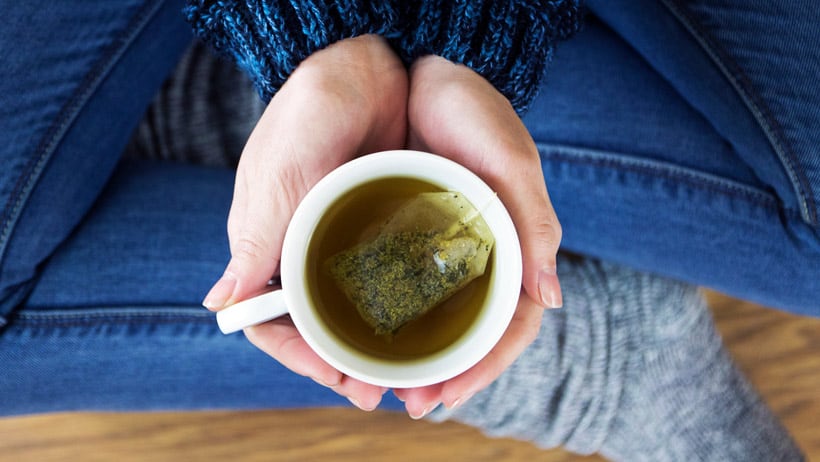
Stress is no joking matter. A Gallup® poll found that nearly 80 percent of Americans feel stressed sometimes or often during the day. Unsurprisingly, age plays a major role in a person’s stress level. People over the age of 50 and without significant obligations in their lives reported experiencing much less stress than younger, employed adults with children under the age of 18. These findings suggest that work and children represent two major stressors.
While finding time for a luxurious spa weekend with friends could help you clear out those pesky stress hormones, that’s easier said than done. The next time you need to calm down quickly and attain a sense of inner peace, try following these 10 tips to relieve your stress.
Breathe
Fast, shallow breathing is a common symptom of stress and anxiety. Beat it by using the 4-7-8 breathing technique, which you can use anywhere, at any time, and without any special equipment. While you can perform this breathing pattern in any position, integrative medicine pioneer Dr. Andrew Weil recommends doing it while seated with a straight back as you learn the technique. Basically, the 4-7-8 breathing technique involves quietly inhaling through your nose (while you mentally count to four), holding that breath for a count of seven, and then exhaling through your mouth as you count to eight. Be sure to place the tip of your tongue against the roof of your mouth just behind your teeth throughout the exercise.
Sip Some Tea
Feeling stressed? Put the kettle on. Beyond the comfort associated with the ritual of preparing and drinking tea, research shows that a neurologically active amino acid found in tea called l-theanine may produce a multifold relaxing effect on the brain within 20 to 30 minutes after ingestion. L-theanine stimulates the production of alpha brain waves, which promote a deep sense of relaxation similar to that achieved through meditation. It also lowers the level of stress hormones in the body, such as cortisol and corticosterone, while boosting levels of calming brain chemicals like serotonin.
Get Moving
Going for a walk will not only physically move you away from a stressful situation, but also lower your stress hormones and improve your mood. In fact, all forms of movement — from bowling to dancing to stretching — offer stress-relieving benefits.
Listen to Music
Slow, quiet, classical music can produce a relaxing effect on your mind and body by slowing down your heart rate and lowering stress hormone levels. Yet, musical tastes can vary greatly from person to person. If classical music doesn’t help you relax, try listening to any other type of calming or uplifting music. Download your favorite songs on your phone so you can listen to them at anytime. If the mood strikes you, feel free to sing along.
Change Your Posture
People who feel overwhelmed and stressed often exhibit their emotional distress in their body language. If you find yourself slouching or slumping over your desk, sit up straight with your belly tucked in and your chin up. This posture change will make you look and feel better instantly. Alternately, do the Superman pose. Standing tall like a superhero with both hands on your hips and legs apart actually can make you feel stronger and in control. Certain yoga poses, such as warrior pose, may produce similar benefits.
Chant Your Favorite Mantra
Mantras can help relieve stress and anxiety in two ways: they help you focus your mind and they provide an alternative to stress-inducing thoughts. According to therapists and wellness experts who recommend mantras to their patients and use them in their personal lives to deal with anxiety, these nine mantras can help refocus and redirect your thoughts. The next time you start to panic about an upcoming meeting, try using one of them to help you calm down.
Snack on Some Chocolate
While you should avoid emotional eating, snacking on some chocolate can give you a quick mood boost when you feel stressed. In fact, research shows that daily consumption of 40 grams of dark or milk chocolate during a two-week period reduces perceived stress — especially among women. Similarly, studies suggest chewing gum can help lower stress and anxiety levels while boosting mood. However, scientists believe the subject needs further research to clarify these effects.
Find Your “Happy Place”
Spending just a few minutes every day in your “happy place” can help you reduce stress, find clarity, and gain a sense of inner peace. But, don’t let the term confuse you. If you live in a lakeside home with a picture window or have a cozy reading nook in your attic, that’s great! If that’s not the case, don’t worry because your “happy place” doesn’t have to be a physical space. You can find your “happy place” in anything from memories of the first time you met your spouse to how you visualize your dream home. All it takes is a memory or imagery that makes you feel positive, safe, and secure.
Put Your Nose to Work
Use your sense of smell to find your inner sweet spot. Light a scented candle, dab some relaxing essential oils on your pillow, or physically stop and smell the flowers to relax and lower stress. Many people find certain scents especially soothing, such as lavender, chamomile, sandalwood, and frankincense.
Laugh
Laughter is indeed the best medicine when you feel stressed. A deep belly laugh can reduce your stress response, calm your racing heart, lower your blood pressure, release endorphins, improve circulation, and promote muscle relaxation — all of which can make you feel better instantly. So go watch a show by your favorite, stand-up comedian. You’ve earned it! Unfortunately, many people find it hard to avoid stress and anxiety in the modern world. Whenever you feel overwhelmed, remember these tips to help you find immediate stress relief. For long-term stress management, consider adopting stress-relieving practices like meditation, yoga, or tai chi.